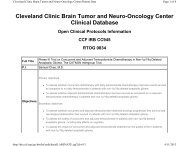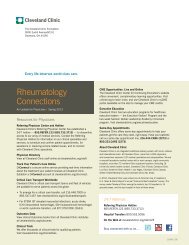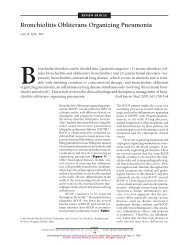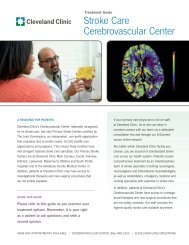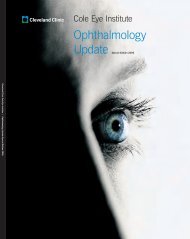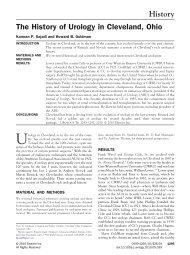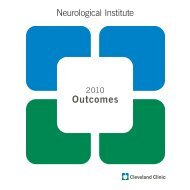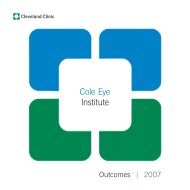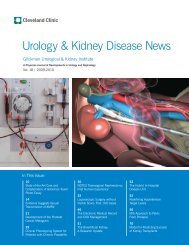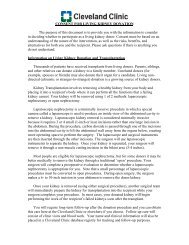Brain Tumor and Neuro-Oncology Center - Cleveland Clinic
Brain Tumor and Neuro-Oncology Center - Cleveland Clinic
Brain Tumor and Neuro-Oncology Center - Cleveland Clinic
You also want an ePaper? Increase the reach of your titles
YUMPU automatically turns print PDFs into web optimized ePapers that Google loves.
2008 ANNUAL REPORT<br />
BTNC Laboratory Research/Innovations<br />
Basic Research Research at Clevel<strong>and</strong> <strong>Clinic</strong> continues<br />
to grow <strong>and</strong> prosper through recruitment of outst<strong>and</strong>ing<br />
new staff, improvement <strong>and</strong> expansion of facilities,<br />
development of extensive infrastructure <strong>and</strong> support<br />
services, <strong>and</strong> enhancement of education programs.<br />
Central to the success of the BTNC is advancing<br />
the care of brain tumor patients through better<br />
underst<strong>and</strong>ing of the causes <strong>and</strong> mechanisms of tumor<br />
development. Basic science research efforts are focused<br />
on identifying the genetic, cellular <strong>and</strong> molecular biology<br />
of malignant <strong>and</strong> benign brain tumors; investigating<br />
the mechanism of tumor formation; <strong>and</strong> exploring new<br />
therapeutic developments for brain tumor treatments.<br />
Below are examples of projects being conducted in the<br />
basic research labs.<br />
• Development of immunotherapy for malignant glioma<br />
using vaccines formed by fusing tumor cells with<br />
dendritic cells (Dr. Gregory Plautz)<br />
• Characterization of the tumor antigen profile of<br />
brain tumor stem cells to determine whether there<br />
are common glioma antigens, which would make<br />
it possible to develop a st<strong>and</strong>ardized glioma vaccine<br />
(Dr. Gregory Plautz)<br />
• The ability of dendritic cell/tumor cell fusion vaccines<br />
<strong>and</strong> adoptive transfer of tumor-sensitized T cells to<br />
cure established brain tumors, being tested in mouse<br />
models as a prelude to future clinical trials (Dr.<br />
Gregory Plautz)<br />
• Investigations into alterations in DNA repair<br />
mechanisms that may improve the chemo- <strong>and</strong><br />
radio-sensitivity of malignant gliomas (Dr. Michael<br />
Vogelbaum)<br />
• Examination of the role of NFkappaB <strong>and</strong> IL-8 in<br />
driving the invasion of malignant gliomas (Dr.<br />
Michael Vogelbaum <strong>and</strong> Dr. Baisakhi Raychaudhuri)<br />
• Production of tumor-specific toxicity in malignant<br />
gliomas by modified small interfering RNA molecules<br />
(Dr. Michael Vogelbaum <strong>and</strong> Dr. Jose Valerio)<br />
• Development of a novel assay for MGMT function<br />
(Dr. Michael Vogelbaum <strong>and</strong> Dr. Cliff Robinson)<br />
BTNC Primary Laboratories<br />
<strong>Center</strong> for Translational Therapeutics –<br />
Vogelbaum Laboratory<br />
The BTNC’s <strong>Center</strong> for Translational Therapeutics,<br />
directed by Dr. Michael A. Vogelbaum, performs preclinical<br />
testing of the most promising anti-cancer agents<br />
that may be of use for treating malignant brain tumors.<br />
One goal of the <strong>Center</strong> for Translational Therapeutics<br />
is to accelerate the lengthy <strong>and</strong> expensive process of<br />
testing new drugs targeted against brain tumors <strong>and</strong> to<br />
safely move these drugs into clinical trials as quickly as<br />
possible for the benefit of patients.<br />
Physicians, researchers <strong>and</strong> scientists involved in<br />
this center work with pharmaceutical companies <strong>and</strong><br />
other medical institutions to identify, obtain <strong>and</strong> test<br />
new compounds. The center’s efforts, including an<br />
international search for all potential brain tumor-relevant<br />
therapies, have yielded several promising agents for<br />
testing. Testing of new agents involves evaluating<br />
the toxicity <strong>and</strong> efficacy of these compounds in the<br />
laboratory <strong>and</strong> in animals that have brain tumors.<br />
In addition, we are investigating the optimal route of<br />
delivery of these drugs.<br />
Because many new therapeutic agents cannot penetrate<br />
the central nervous system, center researchers are<br />
exploring alternative delivery methods. In addition to<br />
investigating the efficacy of oral delivery, researchers<br />
evaluate the efficacy of the agents when delivered<br />
intracerebrally – directly into the brain – via a<br />
specialized neurosurgical technique called convectionenhanced<br />
delivery (CED). Furthermore, in collaboration<br />
with investigators in the Department of Biomedical<br />
Engineering of Lerner Research Institute (LRI),<br />
we are evaluating alternative formulations using<br />
nanotechnology, which may enhance distribution of<br />
potential therapeutics within the brain.<br />
The center has started research projects with a number<br />
of pharmaceutical <strong>and</strong> biotechnology companies ranging<br />
in size from small startup firms to some of the largest<br />
23



